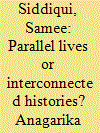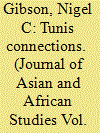|
|
|
Sort Order |
|
|
|
Items / Page
|
|
|
|
|
|
|
| Srl | Item |
| 1 |
ID:
185808


|
|
|
|
|
| Summary/Abstract |
This article compares the ideas, connections, and projects of two South Asian figures who are generally studied separately: the Indian pan-Islamist Muhammad Barkatullah (1864–1927) and the Sinhalese Buddhist reformer Anagarika Dharmapala (1864–1934). In doing so, I argue that we can understand these two figures in a new light, by recognizing their mutual connections as well as the structural similarities in their thought. By focusing on their encounters and work in Japan, this article demonstrates how Japan—particularly after defeating Russia in the Russo-Japanese War in 1905—had become a significant site for inter-Asian conversations about world religions. Importantly, exploring the projects of Barkatullah and Dharmapala makes visible the fact that, from the late nineteenth century until the outbreak of the First World War, religion played a central role—alongside nationalism, race, and empire—in conversations about the possible futures of the international order.
|
|
|
|
|
|
|
|
|
|
|
|
|
|
|
|
| 2 |
ID:
146001


|
|
|
|
|
| Summary/Abstract |
Reflecting on Contested Terrains and Constructed Categories: Contemporary Africa in Focus, a book George Bond and I edited during our work at the Institute of African Studies at Columbia University in the late 1990s, this paper considers the notion of contested terrains, that for George Bond was played out in the scholarship of African studies, in the daily encounters which he had with his colleagues, and in his Zambian research. Bond understood these contestations as continuously operating on and across and often taking place below the surface or at the margins of insititutions. This paper emerged in response to Bond’s invitation to speak about Fanon’s psychiatry writings and Fanon’s critique of sociotherapy on a panel he was organizing at the American Anthropological Association in 2014 (AAA). After he died, the focus shifted to include Bond alongside Fanon and Foucault underscoring the continued need for dialog on the work of three intellectuals—African-American, African Caribbean, and French. The connections and misconnections between Fanon and Foucault is in part the discussion about contested terrains and the willfulness of constructed categories. Indeed, intellectual genealogies, the unknown connections as well as dividing lines was something that interested Bond, the anthrolopologist of the politics of knowledge.
|
|
|
|
|
|
|
|
|
|
|
|
|
|
|
|
| 3 |
ID:
160929


|
|
|
|
|
| Summary/Abstract |
Analyzing photos and narratives of the “widows’ battalion” in Aceh, Indonesia that appeared in international and local print media between 2000 and 2002, this article traces how images of female combatants initially provided evidence of a uniformed, armed ethno-nationalist movement motivated by past state violence and linked to historical legends of women involved in armed resistance to colonialism. Subsequently, the heroines were recast as immoral young women pursuing inappropriate sexual relationships with the occupying military. The problems of intelligence gathering, double agents, and the indeterminate zone of overlap in which male soldiers collaborated in the past were rewritten as a problem of sexual or intimate relations that violated religious and cultural norms. In Aceh, the affective power and complexity of women’s positioning as both victim and combatant is fueled by the invocation of the iconic heroines of the anticolonial resistance and ideas about international human rights. Images and narration of the widows’ battalion appear to champion female combatants past and present, but in fact, contribute to the consolidation of the power of male commanders and combatants in the resistance movement. Analyses of human rights photography must consider the affective power of images beyond engaging the empathy of distant spectators to consider their role in conflict dynamics.
|
|
|
|
|
|
|
|
|
|
|
|
|
|
|
|
|
|
|
|
|